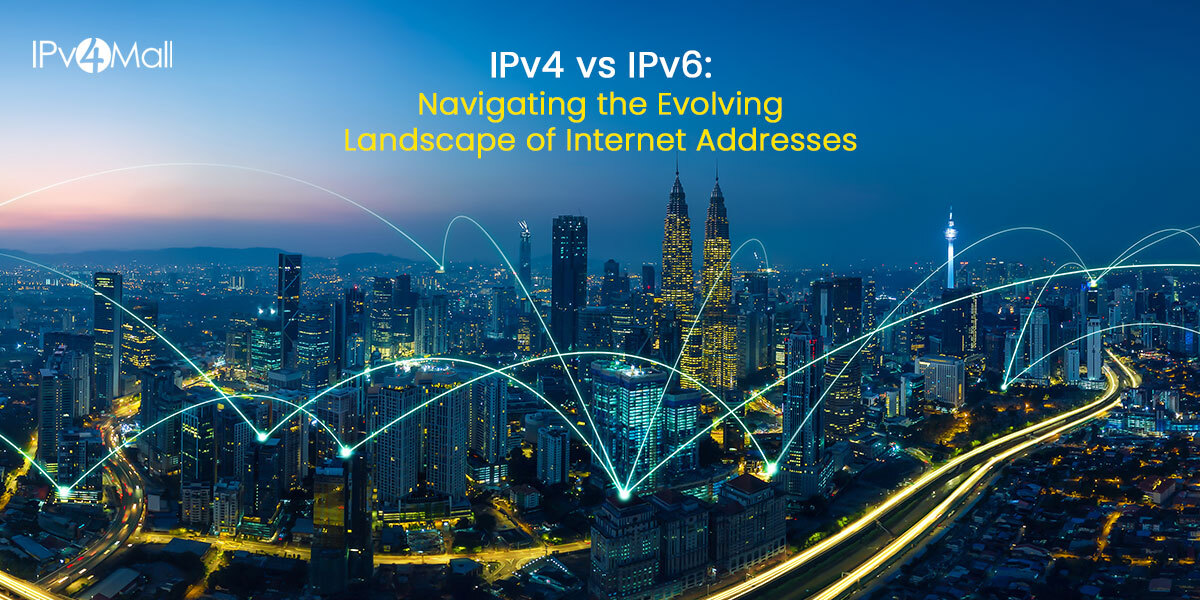![]()

March 14, 2024
IPv4 vs IPv6: Navigating Evolving Landscape of Internet Addresses
The internet has become an indispensable part of our daily lives. From staying connected with loved ones to conducting business and accessing information, the vast network relies on a complex system of communication protocols. One of the most fundamental building blocks of this system is the IP address, a unique identifier assigned to every device connected to the internet.
But just like any technology, IP addresses are evolving. This article delves into the world of IP addresses, exploring the differences between the two main versions: IPv4 and IPv6. We’ll unveil their advantages and disadvantages, analyze the challenges of adopting the newer IPv6, and shed light on the future of internet addressing.
Understanding the Fundamentals
What is an IP Address?
Think of an IP address as your digital house number on the internet. It allows devices to locate and communicate with each other across the vast network. Just like a physical address, an IP address is a unique identifier assigned to a specific device.
A Brief History of IP Addresses (IPv4)
The first version of the internet protocol, IPv4, has been the workhorse for decades. It utilizes a 32-bit address system, which translates to roughly 4.3 billion unique addresses. While this seemed like a vast space initially, the explosive growth of the internet has led to a depletion of these addresses.
Enter IPv6: The Next Generation
Recognizing the limitations of IPv4, the internet community introduced IPv6 in the late 1990s. This next-generation protocol boasts a significantly larger address space, paving the way for a virtually limitless future for internet-connected devices.
Why was IPv6 Created?
The primary reason for creating IPv6 was the exhaustion of available IPv4 addresses. With the increasing number of devices connecting to the internet, from smartphones and laptops to smart appliances and industrial equipment, the 4.3 billion addresses of IPv4 simply weren’t enough.
How Does IPv6 Differ from IPv4?
The most significant difference between IPv4 and IPv6 lies in their address length. IPv4 uses 32 bits, while IPv6 utilizes a whopping 128 bits. This translates to an exponentially larger address space for IPv6, providing enough unique addresses for every grain of sand on all the beaches on Earth, with plenty left over!
Furthermore, IPv6 boasts a simpler header structure compared to IPv4, leading to faster routing and improved efficiency.
IPv4 vs IPv6: A Side-by-Side Comparison
- Address Space: IPv6 wins hands down with its virtually unlimited address space compared to the dwindling pool of IPv4 addresses.
- Security: IPv6 integrates security features within the protocol itself, while IPv4 relies on additional security measures.
- Performance & Efficiency: IPv6’s simpler header structure and larger address space contribute to faster routing and potentially improved network performance.
- Autoconfiguration: IPv6 devices can automatically configure themselves on a network, simplifying setup and reducing administrative overhead compared to IPv4.
- Future-Proofing: With its vast address space and built-in security features, IPv6 is well-positioned to accommodate the ever-growing internet and future technologies.
Unveiling the Advantages of IPv6
Now that we’ve compared the two protocols, let’s explore the compelling benefits of embracing IPv6:
- Virtually Unlimited Addresses: As mentioned earlier, IPv6 offers a near-infinite pool of addresses, eliminating concerns about address depletion and facilitating the growth of the internet. Imagine a world where every device, from your toaster to your self-driving car, can have a unique IP address!
- Enhanced Security Features: Security is paramount in today’s digital world. Unlike IPv4, which relies on add-on security measures like firewalls, IPv6 incorporates security features directly into the protocol. This inherent security layer protects against various cyber threats and bolsters overall network integrity.
- Improved Efficiency and Performance: IPv6’s streamlined header structure and efficient routing mechanisms translate to faster data transmission and potentially improved network performance. This can lead to quicker loading times for websites, smoother video streaming, and an overall more responsive internet experience.
- Streamlined Network Management: IPv4’s reliance on Network Address Translation (NAT) for sharing a single IP address across multiple devices can create complexities for network management. IPv6’s inherent abundance of addresses eliminates the need for NAT, simplifying network configuration and administration.
- Enabling the Internet of Things (IoT): The Internet of Things (IoT) envisions a world where billions of devices are interconnected, collecting and sharing data. IPv6’s vast address space is crucial for supporting this massive growth of connected devices, paving the way for a truly ubiquitous IoT landscape.
Exploring the Challenges of IPv6 Adoption
While IPv6 offers significant advantages, its adoption isn’t without challenges:
- Compatibility Issues with Existing Infrastructure: Not all hardware and software are IPv6-enabled yet. This can create compatibility issues when integrating IPv6 into existing network infrastructure, requiring upgrades or adaptations.
- The Learning Curve for Network Administrators: Transitioning from IPv4 to IPv6 requires network administrators to acquire new skills and knowledge. This learning curve can pose a temporary hurdle for some organizations.
- Dual Stack Implementation Challenges: Many organizations are currently implementing a “dual stack” approach, supporting both IPv4 and IPv6 simultaneously. While this ensures compatibility during the transition, it can introduce additional complexity for network management.
The Future of IP Addressing: A Gradual Transition
The future of internet addressing points towards a gradual shift from IPv4 to IPv6. Here’s why:
- The Depletion of IPv4 Addresses: The pool of available IPv4 addresses is rapidly shrinking. As demand continues to outpace supply, the exhaustion of IPv4 addresses becomes inevitable.
- The Inevitability of IPv6 Adoption: With its vast address space, enhanced security, and improved efficiency, IPv6 is the natural successor to IPv4. While challenges exist, the long-term benefits outweigh the initial hurdles, making IPv6 adoption a necessity for a future-proof internet infrastructure.
Conclusion
The transition from IPv4 to IPv6 is not a race, but rather a marathon. While challenges exist, the advantages of IPv6 are undeniable. As the internet continues to evolve and the number of connected devices explodes, IPv6 will be the cornerstone of a secure, efficient, and scalable internet infrastructure. By understanding the differences between IPv4 and IPv6, we can navigate this transition smoothly and pave the way for a brighter future for the internet.
FAQs
Do I need to switch to IPv6 right now?
The need to switch to IPv6 depends on your specific situation. While not an immediate necessity for all users, understanding the benefits and familiarizing yourself with IPv6 will be crucial for the future.
How can I check if my internet service provider (ISP) supports IPv6?
Many ISPs are already offering IPv6 support. You can contact your ISP directly to inquire about their IPv6 availability and activation options.
Will switching to IPv6 affect my internet connection?
In most cases, transitioning to IPv6 should not negatively impact your internet connection. However, if you encounter any issues, consult your ISP for troubleshooting assistance.
What can I do to prepare for IPv6 adoption?
Familiarize yourself with the basics of IPv6 and its advantages. You can also check if your devices and software are IPv6-enabled. Most modern devices should be compatible with both IPv4 and IPv6.
Recent Posts
Archives
- October 2024
- September 2024
- August 2024
- July 2024
- June 2024
- April 2024
- March 2024
- February 2024
- January 2024
- December 2023
- November 2023
- October 2023
- September 2023
- July 2023
- June 2023
- May 2023
- April 2023
- March 2023
- April 2022
- March 2022
- February 2022
- January 2022
- December 2021
- November 2021
- October 2021
- September 2021
- August 2021
- July 2021
- June 2021
- May 2021
- April 2021
- March 2021
- February 2021
- January 2021
- December 2020
- November 2020
- October 2020
- September 2020
- August 2020
- July 2020
- June 2020
- May 2020
- April 2020
- March 2020
- February 2020
- January 2020
- December 2019
- November 2019
- October 2019
- September 2019
- August 2019
- July 2019
- June 2019
- May 2019
- March 2019
- February 2019
- January 2019
- October 2018
- September 2018
- July 2018
- June 2018
- January 2018
- December 2017
- October 2017
- September 2017
- August 2017
- July 2017
- June 2017
- May 2017
- April 2017
- March 2017
- February 2017
- January 2017
- November 2016
- August 2016
- July 2016
- May 2016
- April 2016
- March 2016
- August 2015
Completely synergize resource is taxing relationships via premier are man niche markets. Professionally cultivate one to one customer.
Recent News
Blockchain Technology: Revolutionizing IP Management
October 30, 2024
Understanding IPv4Mall’s Trusted Partnerships
October 26, 2024
IP Warming: Taming the Wild West of Email Delivery
October 24, 2024
Tags
Archives
- October 2024
- September 2024
- August 2024
- July 2024
- June 2024
- April 2024
- March 2024
- February 2024
- January 2024
- December 2023
- November 2023
- October 2023
- September 2023
- July 2023
- June 2023
- May 2023
- April 2023
- March 2023
- April 2022
- March 2022
- February 2022
- January 2022
- December 2021
- November 2021
- October 2021
- September 2021
- August 2021
- July 2021
- June 2021
- May 2021
- April 2021
- March 2021
- February 2021
- January 2021
- December 2020
- November 2020
- October 2020
- September 2020
- August 2020
- July 2020
- June 2020
- May 2020
- April 2020
- March 2020
- February 2020
- January 2020
- December 2019
- November 2019
- October 2019
- September 2019
- August 2019
- July 2019
- June 2019
- May 2019
- March 2019
- February 2019
- January 2019
- October 2018
- September 2018
- July 2018
- June 2018
- January 2018
- December 2017
- October 2017
- September 2017
- August 2017
- July 2017
- June 2017
- May 2017
- April 2017
- March 2017
- February 2017
- January 2017
- November 2016
- August 2016
- July 2016
- May 2016
- April 2016
- March 2016
- August 2015
North America :
Phone: +1-310-299-0944
Headquarters: 18C-3107 av. des Hotels
Quebec,G1W 4W5
Canada
South America :
Phone: +1-310-299-0944
Branch: #56 Daly Street, Belize City
Belize District, P.O. Box 1825
Belize











Recent Comments